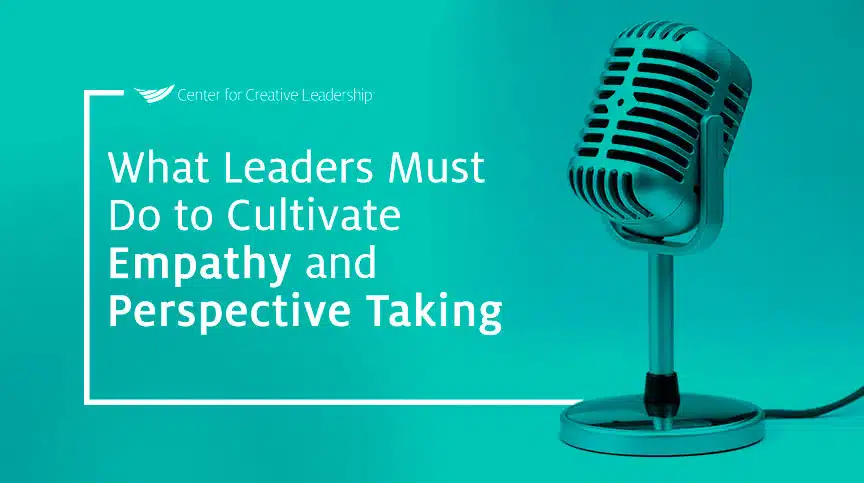- PODCAST
Lead With That: What Leaders Must Do to Cultivate Empathy & Perspective-Taking

In this episode of Lead With That, Allison and Ren zoom out a bit. Instead of focusing on leadership at work, they talk more broadly about what leaders can and should be doing during these difficult times to navigate the hard conversations and make space for the tough questions. Join them as they explore how empathy and perspective-taking are more essential than ever as leaders around the world are challenged with today’s uncertainties.
Listen now or read the full transcript below.
Listen to the Podcast
In this episode, Ren and Allison how empathy and perspective taking are more essential than ever as leaders around the world are challenged with today’s uncertainties.
Interview Transcript
INTRO:
Welcome back to CCL’s podcast, Lead With That, where we talk current events in pop culture to look at where leadership is happening and what’s happening with leadership.
Ren:
At CCL, our primary goal is to develop leaders and leadership for the benefit of society. At Lead With That, our hope is to look around the world, to see examples of developed and developing leaders who are making a difference and contextualize that, and just have a real conversation about it.
But so often, especially recently, we are continually faced with seeing a lack of developing and developed leaders and leadership. Time and again, I look around and I see structures of leadership failing, and time and again, we ask ourselves why? We ask, how can we do better? We ask, shouldn’t we do better? And I don’t mean humanity, though my answer is, yes, we should do better.
But I mean, at CCL and anyone who calls themselves a leader, and I’ll be honest with you, Allison and I often struggle to find glittering examples of leadership, and it’s hard being John Krasinski with the good news. And I’ll also be honest with you, we’re a bit tired of running away and avoiding talking about the real things that are happening out there in the world, and the real role leaders and people like you play in it.
So today we’re going to zoom out. We’re not simply going to talk about leadership in your work or with our clients. We’re going to talk bigger picture, about leadership in the world, about leadership in our future, about leadership and the role that all of us play in making this place just a little bit better, especially for those of us who lead.
Welcome back everyone. I’m Ren Washington, and as usual, I’m joined with Allison Barr. Allison, who’s the best leader you’ve ever had and why?
Allison:
The best leader that I’ve ever had was… Well, her name still is Ellen. I was going to say was Ellen.
Ren:
Great.
Allison:
I’ve had many Ellens manage me by the way, lead me, I should say. So this is Ellen G, should she be listening. Ellen with… Last name starts with a G, I won’t name her. She, I would say had a really keen ability to balance empathy with directedness. And she was consistently transparent, really willing to have conversations with people. She didn’t necessarily agree all of the time, but was willing to enter into conversations that might be difficult, that managers avoid. I would say she was consistent with developmental feedback. You always knew where you stood with her. It might not have been good news, right? But you always knew where you stood with her. I would say there were high levels of trust and consistency in her leadership style.
Ren:
And I couldn’t help but wonder, and I’m thinking too, did any morality guide her perspective as a leader?
Allison:
Any morality? We’d have to ask her, I suppose.
Ren:
But nothing you ever noticed or nothing she made explicitly clear?
Allison:
Well, tell me more about what you mean?
Ren:
Just talking about goodness, I think. The more I think about our work and what’s going on, the more I keep on thinking about a leader’s job to facilitate goodness, but I want to be careful because I’m not bound by moral goodness. Those of you out in the world who know me, well, I’d like to think I’m good, but maybe morally ambiguous, but I just wonder… So she made an impact. She had these things, she was a good leader. Did she facilitate a positive environment and how did she do it?
Allison:
I think what she did very skillfully was transparently help everybody to understand the environment that we were in. She was also, and still is a very positive person, and she didn’t shy away from the hard stuff. And that’s what I admire about her, is that sometimes things were hard. Sometimes we failed. Sometimes we didn’t make our goals. Sometimes we didn’t like her decisions.
Allison:
Actually, what I admired more was navigating those conversations and facilitating dialogue around when things weren’t so great, which I think is a lot harder to do than to look around and say, “You know what? Everything, here are all the good things that are happening.” When you do that, the negative stuff still exists. So it’s a great thing to be positive, but especially right now, I think we have to be careful that we’re not bypassing some of the tremendous heartache and obstacles that people are facing. I think that’s worse.
Ren:
Yeah. Things are not good right now, and I hate to be so morose. There are pockets of goodness everywhere, but when I think yes, things aren’t good and we’re not able to, I don’t even think bypass the negativity because there’s so much negativity, but I did wonder how do you lead in an environment where even that’s debated? And I was just talking to my son’s friend’s mom. I was working out the math and that we were outside and we all, for those of you who know, we live in Highland Park, Illinois. My wife and I live less than a five-minute walk away from downtown Highland Park where that horrendous shooting occurred. And my son’s friends were there and everyone’s safe, but some people had… they all had to run and flee, and we’re all dealing with the fallout from that.
Ren:
But one of the things that we’re dealing with is we were just having a discussion around the playbook, the playbook of who comes out after a gun atrocity happens in America? About both sides who come out, about the NRA, who talks about, “Everyone, shore up, they’re coming after your guns now.” About the Dems or left who come out and say, Everyone, we want to get rid of the guns,” or whoever says that, or the people in the middle who are here to agitate. We had a rally to support those who are mourning and there were people who were advocating the protection of Second Amendment rights across the street as if there was a debate, instead of just the mourning.
And so how do you facilitate as a leader, or even have a conversation when people are so vehemently opposed with each other, when they look at each other and like, “Nope, not a tragedy that messes with me, or too bad for you, this is good for me?”
Allison:
Yeah. That’s a big question. And in some ways, it feels like it shouldn’t be that hard. Your experience is your experience. And for me to invalidate that would be a terrible thing. It seems like basic human treatment to acknowledge you have gone through a terrible experience. Your son did as well, your family, your neighborhood, your community, to hyper-individualize and experience where somebody has gone through great trauma and pain, and probably loss for a lot of people is a scary thing.
You asked me, “What can you do?” And I went the opposite way, only to acknowledge that you could have a differing opinion than somebody and still give them space to share their experience or grieve their experience, or navigate their own experience, versus saying, “Well, you’re coming after me now, or that was just deployed to go after your right…” Whatever, whatever people are saying, right?
It’s this focus on others that is holistically lacking. It’s a lack of community. It’s a lack of caring for people that has me feeling frankly, a little bit scared that we cannot acknowledge someone else’s experience. Your experience is your experience. So again, it feels very basic. At the same time, people aren’t able to do it.
Ren:
Well, I think we’re getting at some of the route that I want to start to explore here, and in talking about the things that we care about, that we have as our experiences, and that idea of community and how maybe we’re losing sight on that or that togetherness. And I wonder if you and I can’t use one of the spaces for conversation in this space, just thinking about you and I were talking about a couple of things that we could talk about today around leadership’s big picture role in society. One of them being the horrendous shooting there. Another one being the Supreme Court Roe v. Wade, and a plethora of other decisions.
But it’s really interesting as you use that language, and I think you and I share wholeheartedly our opinion on where we stand and what happened with Roe v. Wade. If I’ve never expressed that I’m aligned with you, I am. However, I wonder using your language as I contextualize leadership’s role and how damn hard it is to have meaningful conversation that makes a difference in people’s lives, you said we have to appreciate each other’s experience. For those people who think Roe v. Wade was a travesty and for those people who celebrated the overturning of it, how do you facilitate conversation that makes us better, as opposed to agitates us and makes us worse?
Allison:
That’s tricky because I think there’s a lot that goes into what you just said in the specifics of Roe v. Wade or the specifics of the Highland Park incident, and it’s very tricky.
Ren:
Yeah.
Allison:
I have friends who disagree with me, who… I will clarify. I have a friend who disagrees with me and was celebratory over the overturning. And I need to acknowledge my own mental state before I get into a dialogue with her because I want to have a productive conversation. And if I am feeling rattled, we’re not going to be able to, so we have to set ground rules.
I want to hear your perspective and my request is that you hear mine as well, otherwise I’m not going to enter into this conversation with you. I’m not going to, so it’s tricky. If you can’t have both people open to dialogue and controlling and regulating their emotions, these are 2 topics that are emotional for people, if you can’t regulate your emotions, then it’s not a good idea to be in those conversations.
Ren:
And maybe that’s what… When I was thinking about structures of leadership failing, our inability, damn it, our lack of practice and managing emotion.
Allison:
Yeah.
Ren:
And we talk about emotional intelligence all the time and I think maybe as we start to say, “Well, what is leadership’s role?” Damn it, I pause. You know what? Actually, I think some of the scariest leaders out there, they do manage emotions really well. They manipulate them. They use them for their own means. We were talking and we didn’t really explore it last time, but we could have in more depth, is Elon Musk a leader?
Allison:
Yep.
Ren:
And I was like yeah, a crappy one, but still a leader. And there’s so many people who are in these positions of power who are just miserable. And maybe he’s not an example. I’m sure he is a complex human being, as they all are. But when I look at the animus that exists between us, there’s no level-headedness like you just recognize around yourself. Even a recognition if I have to own where I’m feeling, to want to have a conversation. I don’t see enough people in roles of leadership doing that and it reminds me then, well, maybe those people who have the title don’t have all of the power.
Allison:
Yeah. I would agree with that. And I also want to acknowledge, these are precarious times. And when I managed people, these weren’t the conversations. These were not the conversations that we were having. I shared before that I was a manager in a time where there was a mass shooting too, actually, and those were handled as well as could be handled. And it’s so tricky because I remember a specific leader in that company saying, “We have to get on with business. We have to move forward. So we’re not going to be talking about this.” So it’s just interesting, right?
And in terms of having a toolkit to navigate these types of conversations, I don’t think a lot of people were taught these skills, like as human beings, even growing up. I think it’s okay to look at our culture. I think it’s okay to look at history. I think it’s okay to look at education or lack thereof. There are a lot of complexities that play into this. And interestingly enough, I was facilitating a session on influence this morning. And somebody said to me, “How do you differentiate manipulation and influence?” Which is sort of what you were just talking about using, controlling their emotions to a negative extent, right?
And part of the difference is, am I using my influence to think about what it is that you need? Or am I thinking about my own needs? And I think there’s a lot of leadership right now that is heavily focused on individual needs. What can I get out of this? Well, if I tell everybody that some made up science about a woman’s body just made up and consistently say it with clarity, and it’s shocking how many people believe that. So there’s influence that’s being used for bad, rather than good.
Ren:
I always think of that dynamic of the manipulation. And I use Michael Angelo, doesn’t he manipulate the clay to make beautiful pieces of art? So I think manipulation doesn’t have any inherent villainy to it, other than the fact that humanity has, at least Americans have used that word, in our lexicon to describe ill-behavior. And I think you highlighted there, influencing to what end?
Allison:
Yeah.
Ren:
Am I influencing to serve my own ends? And then you’d have to investigate, well, are those ends diabolical? Because I would actually tell some people, I’m one of them, I’m really introverted. If I don’t meet my own needs, I can’t meet the needs of others, and maybe that’s a different conversation that we’re alluding to. I think it is, but when I think about leaders and leadership, I think too often, I’m faced more and more with the idea that power corrupts and absolute power corrupts absolutely. One of my favorite phrases.
And then I look at leadership and regardless of the titles and phrases that you would use, when I think about the people who are setting the tone for what happens, I keep on thinking about where power really lies and the social process of leadership? At CCL, we talk about the important distinction between a title doesn’t give you leadership power or authority necessarily, or maybe the more sustained power and leadership and authority comes from those connections that we have with each other, those people who don’t have titles, that silent majority. And I think all of us, a lot more of us, the silent majorities aren’t divided, we’re united. And I think we’re kept quiet by systems that are designed to maintain themselves.
Allison:
Yeah.
Ren:
When I look at leadership structures, aren’t they designed to perpetuate that leadership structure across most systems? And then, okay, well, when I think about people who really move and shake in organizations, sure, I need to talk to so and so to get decisions made, but if I don’t have one person on my side, then it’s never going to happen. And that one person is an executive assistant of so and so or something. And it’s trying to unlock more of that potential and power in those quiet places where leadership really thrives, is what I’m trying to make sense of.
Allison:
Yeah. And I want to back up if that’s okay, because this is important.
Ren:
Please.
Allison:
This is important to me, is that there is manipulation where you’re making art or manipulating, I don’t know, whatever, some sort of painting or whatever it is. And then there’s psychological manipulation, which is the means to exploit control or otherwise try to influence to one own’s advantage, and that’s the kicker there, is like, it is negative. Manipulation with people is not good. It’s negative, it’s inherently negative.
And so I think leadership in general, we could serve to investigate different avenues of leadership. I think you’re right. In the US, if you keep uncovering or peeling the onion, if you will, where did leadership start? Where did this come from? Traditionally in the United States, we’re a very Eurocentric model of leadership, and I think of this Roman Empire where it’s fighting and who can come out on top? And that’s not how CCL defines leadership. It is what you said. It’s a social process and how can we uncover those nuanced behaviors of leadership that aren’t so outdated, frankly outdated? This isn’t what people need anymore. So how can we shift it?
Ren:
And I think we, you, me CCL organizations like it, and anyone else who would fashion themself as a leader, we are it. My son was confused after July 4th. He was confused about a lot of things, but he was really confused about why things like this keep happening? And I’m inspired because his generation and generations after his are going to look around, much like we did when we look at past things and say, “What the hell were you all thinking?” And I always think about one of my brilliant examples. They were like, “Hey, pregnant ladies, smoke cigarettes. It’s good for you and the baby.” And now we all look at each other and we’re like, we’re freaking crazy. And I got to imagine, years from now, they’re going to look back and like, “Damn, how could you all be so dense?”
And maybe I’m just thinking about… I go back to the thing I said about goodness. I don’t know if there needs to be morality of what’s good or bad, but I know sure as shit that we’re not doing the right kinds of things if things like July 4th can happen, or if things like we are so desperately desirous to please these polls, when so many of us are like, “Can’t we find a middle path? Because so many of us would need it.”
Allison:
Yeah. And the interesting thing about what you said is that, gosh… See, this is where it gets messy because I feel like I have to be careful and I’m… Most Americans did not want, the majority of Americans did not want Roe to be overturned, and supposedly we’re a majority culture. The majority of people want reform in terms of what happened on the 4th, and what continues to happen. By the way, there were 15 more shootings since then, 15.
So most Americans want reform and that’s what I mean in going back to manipulation. The messaging that’s being communicated by people who have power is not true, and so that is inherently a very big problem, a very big problem.
Ren:
Yeah. I often reflect on marketing departments and their skill. If anything, the major debate for me, and we’re not going to dig too deep into this, but pro-life, pro-choice was just a branding win. How could you ever defeat-
Allison:
Oh.
Ren:
Pro-life? Who would stand in opposition to life? And I think what an unfair, balanced presentation of an argument that, going back to something you said earlier, is much more nuanced when we need to identify each other’s lived experiences, to have a conversation like, “You and your friend are going to be an interesting nexus of what the world can hopefully do.” Two people who care about each other–
Allison:
Yep.
Ren:
Who disagree on something that’s core to them. How do you come to the table and have a real conversation? Because frankly, that’s most of us. Regardless of how you feel about what Allison and I are talking about right now, we are ill-equipped, myself included, to have a healthy, measured conversation about things that I vehemently and spiritually, and philosophically disagree with because I just don’t have enough practice. And I think leaders don’t demonstrate space for practice. Instead, they demonstrate ways to shore up your defenses.
Allison:
Right.
Ren:
To manipulate in the worst kind of ways like you were talking about. Instead, I think about those uniters, those unifiers, those people who advocate, but bridge and connect, and do all of those influence tactics that serve as the glue in these communities. The people behind the scenes who get things done, not the people shouting the loudest.
Allison:
Yeah. Again, another interesting conversation, I actually overheard this conversation, if you’re listening and this was you at the airport, I’m sorry, but I overheard, which somebody said, “There are people I don’t want to be united with. I don’t want to be united with people who are violent.” And again, I’m being cautious here but, “I’m not going to be united with a White supremacist.” So what do you think about that?
Ren:
Right.
Allison:
White supremacists, by the way, White supremacy, that’s not a values conflict. I guess it is, but that’s not someone I would… I don’t know. Tell me what you think?
Ren:
Well, I often do this. So we talk polarities a lot in my household because we are leadership development people and our kids are going to hate us, and they’re going to go to therapy and be like, “Oh, I don’t like no leadership development stuff.” So my wife and I do this kind of work and we talk polarities management in this space, Allison UI and all of us, around a lot of things aren’t challenges or rather problems to solve, but challenges to manage. Inhaling and exhaling is a perfect example of the polarity of 2 things that you need to do equal of.
And I would say, White supremacy or hate, those aren’t polarities.
Allison:
Right.
Ren:
That’s a problem to solve.
Allison:
Right.
Ren:
When someone would marginalize, minimize and cause harm to someone, that’s not a paradigm… that’s not a polarity. I often use like racism is not a polarity to solve. I don’t know if there’s an overabundance of what are the good things of racism? Like that’s not–
Allison:
Right, but you will hear people say, “We all need to get into conversation,” and that’s not going to do anything.
Ren:
Well, we might need to have a conversation of… There are different things about a polarity. What the polarity of conversation and racism we could talk about is the in-group, out-group polarity, of over-indexing on an in-group, over-indexing on an out-group, and vice-versa, and that you could boil down, that’s just outside of race. So you could think about that in general human connection.
So what I couldn’t help, but think about though, when you were talking, was the subjectivity and combination of villainy. You were using White supremacy as someone who doesn’t want to coordinate, people not wanting to be united with. I know people who believe the same level of villainy for those who would broadly support legislation that supports a woman’s choice. That is on par with the villainy that is White supremacy.
Allison:
Right. And so, I think they’re in my point, right? There’s a quote, and I’m going to butcher it because now I can’t remember exactly who said it, but it’s like, “If you remain silent about oppression, you’re the oppressor as well. You are the oppressors. Can’t see oppression, you are perpetuating oppression.” So that’s a whole other podcast. I don’t know if we want to go down that rabbit hole. I’d be happy to, but I don’t know if we need to or want to right now, but a woman’s right to choose, taking away a woman’s right to choose, women are going to die. A lot of women, a lot of women are going to die, and it unequally will be worse for communities who have multiple marginalized identities.
So it’s going to be disproportionately impacted. If you cannot see, or even try to learn about that. Again, this is another conversation. That’s what I mean by if you’re someone who believes that a woman who has an ectopic pregnancy with a fetus that’s not viable in the first place, the fetus is not viable. The only chance that woman has to survive to live is to have that pregnancy terminated. So you’re telling me that… how pro-life is that?
Ren:
And what an interesting manifestation of how violently the pendulum swings around what we were talking around, where like the polls are making legislation or calling out these things when normal people would say, “Well, wait, isn’t it weird?” Even people in my life who know, who actually, who are looking forward for new kinds of legislation and conversation to manage this idea of a baby’s life and the sanctity of it differently, recognize that, whoa, whoa, whoa. If this means that we’re just going to throw women in jail for that very thing… Some of the legislation that I’ve read is talking about just zero excuse, for anything. Just like you’re talking about.
Allison:
Right.
Ren:
And if it happens and you happen to survive, then all that’s waiting for you is a jail cell because you’ve participated in the death of removal or something. That’s an interesting curiosity around, that doesn’t sound much like common sense. That sounds like a few people who are really leaning into a few central areas when a lot of people are like, “Well, how do we find a path where we can just have some more conversation?” And I think that is where… I don’t know what goodness looks like, and I know that’s a hard conversation to have, but I have to believe that people who lead have a responsibility to do better for those they care about.
And then here we are at the same point. Isn’t that really in essence, what the people who oppose each other on those sides is? Is, “I care about…” I don’t know.
Allison:
Well, you mentioned systems earlier. Sometimes it’s hard to see systems and how we are in a system that perpetuates all of those things that you just said. So we talked about racism, White supremacy, deep-seated misogyny, and sexism was a system that you just reminded me of, right? And it’s almost like… You talk about goodness. It’s almost like a philosophical conversation too, and is goodness possible in these structures? Is it? I don’t know. I don’t know. Is it possible?
And then did you ever take a philosophy class in college or anything?
Ren:
Yes. Big in… I have my existentialism thread, Buddhism, you name it. I’m currently a niellist, so let’s go for it.
Allison:
So I’m sure then, I’ll never forget this. This conversation went on way too long in a philosophy class that I took in college, where the professor said, “If a butterfly flaps its wings in Japan, what impact does that have on you?” And I lived in Ohio at the time, or I was in school in Ohio. “Does that have an impact on you?” And no, of course it doesn’t, but then you start digging, right? You start digging and that’s a more benign general example, but the point is perspective taking is so important, understanding how decisions are made and the impact and the domino effect and the trickle down.
And so that’s what I mean when I said at the beginning of this conversation, we’re hyper-individualized. “Well, it’s not going to impact me.” I live in a state in Colorado, it’s protected. I would be okay, but I care about other people. And I know that there will be a greater impact here, a much greater impact. So I think the ability to take perspectives and look at things and how they impact other systems and other people is a good place to start, but you have to be willing. You have to be willing to do that.
Ren:
You do have to be willing and you cited a friend or someone you overheard who said, “I just don’t want to unite with some people.” And I was talking to a colleague of mine the other day, and they were having a conversation with someone around how they’re just tired. They’re done extending the olive branch, that they’re shoring up their own ends and I resonate with it. Damn it, do I resonate with it? There’s so much that’s making me tired and I’m so… There’s so much in me that’s so tired in the fight that I… instead of stay open, I get closed and I get harder to deal with.
And I think when I start to… We zoomed out and think about leadership and leaders, and I want to zoom back into you, whoever’s listening. And if you would think that you want to lead or need to lead or want to do something different, then part of the onus is to push through that tiredness because a lot of us, we disagree. This nation is predicated off of disagreement. Even when we agree in large numbers, there’s still a whole crap ton more people who disagree in large numbers.
And so we don’t have a choice, but to find those things that connect us and leaders have to find a way to… I don’t know, to recharge because it’s going to be tiring, but we can’t. We can’t say, “I’m done talking to you,” because again, you and your friend, let’s say, that’s it. I’m done talking to you. Well, damn it. I guess, are we going to… Is that worth it? Is it worth it to lose our connection over something that maybe there’s more that binds us? And if we found a way to talk to each other, could we find something that works where someone could look at your ectopic pregnancy example and say, “No, wait a minute. Maybe this is a circumstance where all of us could agree, where there is room for common ground?”
Allison:
Yeah. It’s very complicated.
Ren:
Yeah. Right.
Allison:
It really is. I think if somebody’s harming me in a conversation, I absolutely will close the door on that conversation. That’s what I mean. You have to have norms and respect, and before all of that, you have to know yourself, and that’s where it becomes really hard. I had a conversation with somebody once and I said, “I want to continue this conversation. I have to exit it for now because this is my work. I’m getting really riled up and this is my work. So can we come back to it?”
And that’s hard for people to do. People don’t… It’s just hard. It’s just hard work. So I think it’s always going to come back to self-awareness for me and acknowledgement of like, am I helping or am I harming? Am I helping or am I harming?
Ren:
Yeah. And the hard work being… Reporter Krause, if you’re listening to this, how lucky are we? Mentor, trainer, facilitator extraordinaire, and she once said in a classroom that I was in and something that I say still to people that I work with, as a leader, you’re in this room now, you’ve given up the right to work less hard. You’ve acquiesced your… You’ve abdicated your chance to say, “Nah, let someone else do that.”
And so I just go down to our goal at Lead With That, to contextualize what’s happening out there. And I’m feeling it more now than ever and I’ve just had a conversation with our own leadership at CCL, so I’m not blowing smoke people, that I need to find a way to make a difference, and I need to find a way to bring people to the table that I care about, who disagree with me. I have got to find a way for us to look at tragedy and not get numb to it and shrug our shoulders. There’s way too many shrug emojis and there’s way too many of us relying on a few people who clearly care more about maintenance and maintaining their standard than doing things that a lot of us just look at and say, “Wait a minute, is there something missing here?”
And so I just want to get more voices in the conversation around all of us who kind of scratch our heads and suffer in silence and say, “Should we talk about this?” And it’s going to be hard, and it’s finding a way to push through it because we’re not always going to agree. You and I disagree and we like each other, and we’re on the same damn side, and know how hard it is when people don’t like each other and are on different sides.
Allison:
Yeah.
Ren:
So yeah. I don’t know.
Allison:
Yeah. I think from an organizational perspective, always, but especially right now, organizations have a responsibility to create that wellbeing and the belonging, the things that you’ve described and overall inclusive environment, which is very hard to do right now. However, all leaders, like you said, need to nourish that inclusivity and it becomes really, really hard. It’s difficult. It’s okay to acknowledge that, it’s very hard. I would say that empathy and perspective-taking are crucial skills to harness, and thinking about… “This person disagrees with me” and just asking yourself the question, “Why?” 5 times. There’s a philosophical structure around this. I apologize, I’m forgetting the name of it. And it’s asking yourself the question, “Why?” 5 times. “I disagree with Ren on XYZ. Why do I disagree with him? Because it conflicts with my values.” Or whatever it is. You have to get down to that root, and then you’ll be able to take the perspective. Right? Okay. “Well, I understand where he’s coming from,” and it’s okay. You still might disagree. That’s okay, but then you start to understand people’s life experiences, the things that are happening right now that will cause people great harm, while it might not cause you great harm, it might for others, and that’s important. It’s important to be able to respect people’s lived experiences, especially those people who are different from you.
Ren:
Yes. And when you say that, I got to remind myself to take my own medicine.
Allison:
Yes. I hear you. I hear you. We can remind each other. I’ll do it too.
Ren:
Yeah.
Allison:
Yep. So I think we could go… I could go on and on and on. I’ll digress. What do you say? Should we… We can end.
Ren:
I know. Well, we got more, right? We’ll load it in, come back next time and we’ll keep talking about things.
Allison:
Yeah. And I think I just want to acknowledge to you Ren and to all of our listeners, it’s okay. Things are hard right now. It’s okay if you’re struggling. We understand and appreciate always the hard work of the CCL podcast team that gets our podcast off the ground and running, and you can find our show notes and all of the links to our podcast on ccl.org. And we look forward to tuning in next time. And as always, let us know what you want us to talk about. You can find us on LinkedIn. Thanks again, Ren.
Ren:
Yeah, we appreciate it. Thanks a bunch, Allison. Thanks everyone.
Allison:
Bye.
Ren:
See you next time.
| Related Solutions
Sign Up for Newsletters
Don’t miss a single insight! Get our latest cutting-edge, research-based leadership content sent directly to your inbox.







